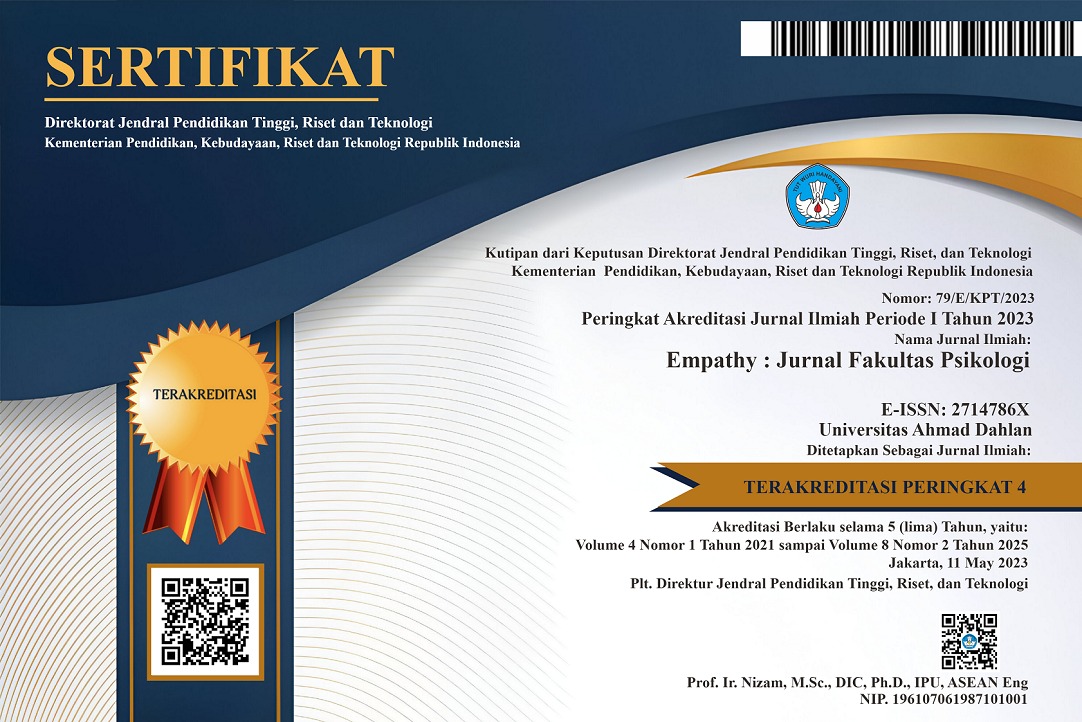Analysis of Self-Regulation in the Rencong Telang Islamic Society Perspective of Social Cognitive Theory
Abstract
Keywords
Full Text:
PDFReferences
Miharja, D. (2013). Integrasi agama Islam dan budaya Sunda: Studi pada masyarakat adat Cikondang Desa Lamajang Kecamatan Pangalengan Kabupaten Bandung. (Doctoral dissertation, UIN Sunan Gunung Djati).
Mudzakkir, A. (2011). Revivalisme masyarakat adat dalam politik lokal di Indonesia pasca-Soeharto: Studi kasus Komunitas Kampung Naga, Tasikmalaya, Jawa Barat. Jurnal Masyarakat & Budaya, 13(1).
Tim Penelitian Sejarah dan Budaya Kerinci. (1972). Depati Parbo Pahlawan Perang Kerinci. Sungai Penuh: Pemerintah Kabupaten Kerinci.
Haslam, S. A., & Reicher, S. D. (2006). Stressing the group: Social identity and the unfolding dynamics of responses to stress. Journal of Applied Psychology, 91(5), 1037-1052.
Husain, A. (2012). Islamic psychology. Institute of Objective Studies.
Lukito, R. (1997). Islamic law and adat encounter: The experience of Indonesia (Doctoral dissertation, Institute of Islamic Studies, McGill University). Retrieved April 19, 2021.
Rahim, A. (2019). Regulasi diri dalam masyarakat Islam: Sebuah analisis literatur. Jurnal Psikologi Keagamaan, 8(1), 45-62.
Zainuddin, M. (2017). Rencong Telang: Komunitas Adat Kerinci Sumatera Tengah. Yogyakarta: LP3M Universitas Muhammadiyah Yogyakarta.
Bandura, A. (1986). Social foundations of thought and action: A social cognitive theory. Prentice-Hall.
Yuzarion, Y. (2022). Model teoritis dinamika psikologis self-regulated learning. Jivaloka Mahacipta.
Baumeister, R. F., & Vohs, K. D. (Eds.). (2004). Handbook of self-regulation: Research, theory, and applications. The Guilford Press.
Murdan. (2016). Harmonisasi hukum adat, agama, dan negara dalam budaya perkawinan masyarakat Islam Indonesia. Asy-Syir’ah Jurnal Ilmu Syari’ah dan Hukum, 50(2).
Heine, S. J. (2016). Cultural psychology: Third edition. W. W. Norton & Company.
Voronov, M., & Weber, K. (2020). People, actors, and the humanizing of institutional theory. Journal of Management Studies, 57(4), 873–884. https://doi.org/10.1111/joms.12559.
Machi, L. A., & McEvoy, B. T. (2016). The literature review: Six steps to success. Corwin.
Booth, A., Sutton, A., & Papaioannou, D. (2016). Systematic approaches to a successful literature review. SAGE Publications Ltd.
Ridley, D. (2012). The literature review: A step-by-step guide for students. SAGE Publications Ltd.
Fink, A. (2014). Conducting research literature reviews: From the internet to paper. SAGE Publications Inc.
Aveyard, H. (2014). Doing a literature review in health and social care. Open University Press.
Cholif, M. A. (2009). Timbul tenggelam persatuan wilayah Luak XVI: Tukapkhunut di bumi undang tambang teliti. Jambi: HBA Sukses.
North, D. C. (1990). Institutions, institutional change, and economic performance. The political economy of institutions and decisions. Cambridge, New York: Cambridge University Press.
Djakfar, I., & Idris, I. (2001). Menguak tabir prasejarah di alam Kerinci. Sungai Penuh: Pemerintah Kabupaten Kerinci.
Leeds, B. A. (1999). Domestic political institutions, credible commitments, and international cooperation. American Journal of Political Science, 43(4), 979. https://doi.org/10.2307/2991814.
Marsden, W. (1999). Sejarah Sumatra (A. S. Nasution & M. Mendim, Trans.). Bandung: Remaja Rosda-Karya. (Original work published 1811)
Yakin, R. (1986). Menggali adat lama pusako usang di Sakti Alam Kerinci. Sungai Penuh: Tanpa Penerbit.
Zainuddin, M. (2014). Memperalat agama: Pergeseran rasionalitas tindakan sosial. Yogyakarta: Samudra Biru.
Myers, D. G., & Twenge, J. M. (2019). Social psychology. McGraw-Hill Education.
Abdullah, T. (1966). Adat and Islam: An examination of conflict in Minangkabau. Indonesia, 2(24).
Permata, A. N. (2008). Ideology, institutions, political actions: Prosperous Justice Party (PKS) in Indonesia. ASIEN, 109(October), 22–36.
Smelser, N. J., & Swedberg, R. (2005). The handbook of economic sociology, second edition (2nd ed.). Princeton, N.J.: Princeton University Press.
Badawi, J. A. (2007). Islamic values and management practices: Quality and transformation in the Arab world. Edward Elgar Publishing.
Wekke, I. S. (2013). Islam dan adat: Tinjauan akulturasi budaya dan agama dalam masyarakat Bugis. Analisis, XIII(1).
Sanusi, I. (2020). Kebangkitan Islam Minangkabau: Analisis terhadap anatomi konflik dan politik identitas kultural masa lalu. Majalah Ilmiah Tabuah: Ta’limat, Budaya, Agama dan Humaniora, 24(2), 148–165.
Davidson, J. S., & Henley, D. (Eds.). (2007). The revival of tradition in Indonesian politics: The deployment of adat from colonialism to indigenism. Routledge contemporary Southeast Asia series 14. London, New York: Routledge.
Rahman, F. (2002). Kuasa simbolik adat dan syarak dalam tradisi masyarakat Melayu. Kota Jambi: Pascasarjana UIN Sulthan Thaha Saifuddin Jambi. Retrieved April 19, 2021.
Rahman, M. A., & Rahman, F. (2018). The dynamic of Malay Islamic Law: The rise and practices of adat bersendi syarak, syarak bersendi kitabullah in Jambi. Journal of Indonesian Islam, 11(2), 389. https://doi.org/10.15642/JIIS.2017.11.2.389-404.
Ulum, B., Arifullah, M., & Fuhaidah, U. (2018). Conserving Islamic Law and Seloko Adat Melayu Jambi in the Globalization Era. In 1st International Conference on Recent Innovations (pp. 1045–1051). SCITEPRESS - Science and Technology Publications. Retrieved April 19, 2021.
Henley, D., & Davidson, J. S. (2008). In the name of adat: Regional perspectives on reform, tradition, and democracy in Indonesia. Modern Asian Studies, 42(4), 815–852.
Moniaga, S. (2007). From bumiputera to masyarakat adat: A long and confusing journey. In J. S. Davidson & D. Henley (Eds.), The revival of tradition in Indonesian politics: The deployment of adat from colonialism to indigenism (pp. 275–293). Routledge contemporary Southeast Asia series 14. London, New York: Routledge.
Tyson, A. D. (2010). Decentralization and adat revivalism in Indonesia. Routledge.
Wekke, I. S., Bukido, R., & Rumkel, N. (2018). Islam dan adat: Keteguhan adat dalam kepatuhan beragama. Yogyakarta: Deepublish.
Zainuddin, M. (2020). PgongPakae: Konflik dan Resolusinya pada Masyarakat Kerinci. Yogyakarta: Samudra Biru.
DOI: http://dx.doi.org/10.12928/empathy.v6i2.27256
Refbacks
- There are currently no refbacks.
Copyright (c) 2023 Linda Agustina, Mahli Zainuddin

This work is licensed under a Creative Commons Attribution-ShareAlike 4.0 International License.
================================================================================================
ISSN 2303-114X (print) || 2714-786X (online)
Organized by the Faculty of Psychology
Published by Universitas Ahmad Dahlan, Yogyakarta
Website: http://journal.uad.ac.id/index.php/EMPATHY
email: empathy.jfp@psy.uad.ac.id
Lisensi Creative Commons Atribusi-BerbagiSerupa 4.0 Internasional




